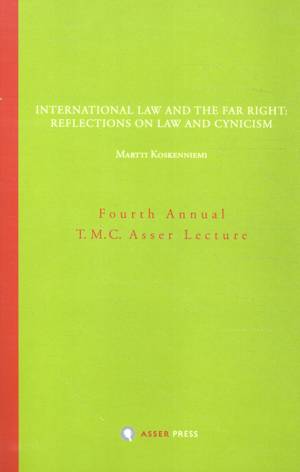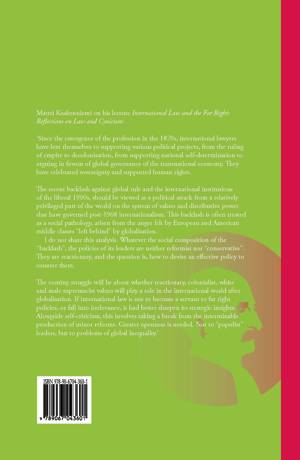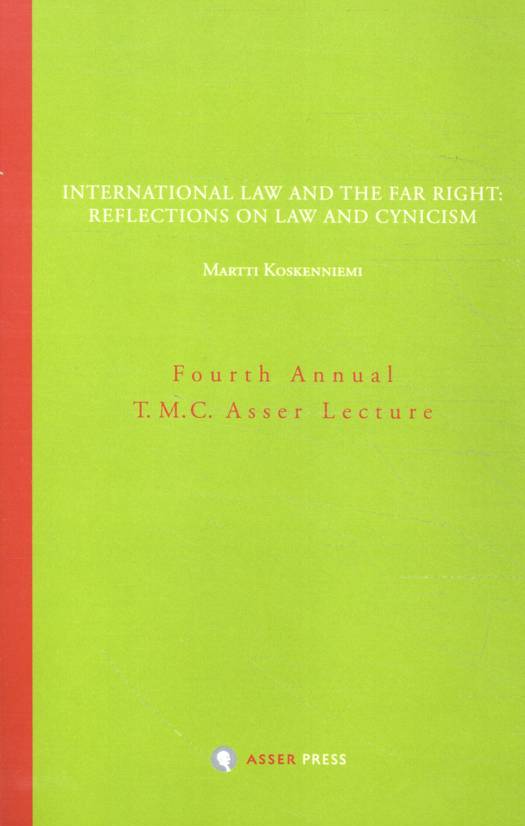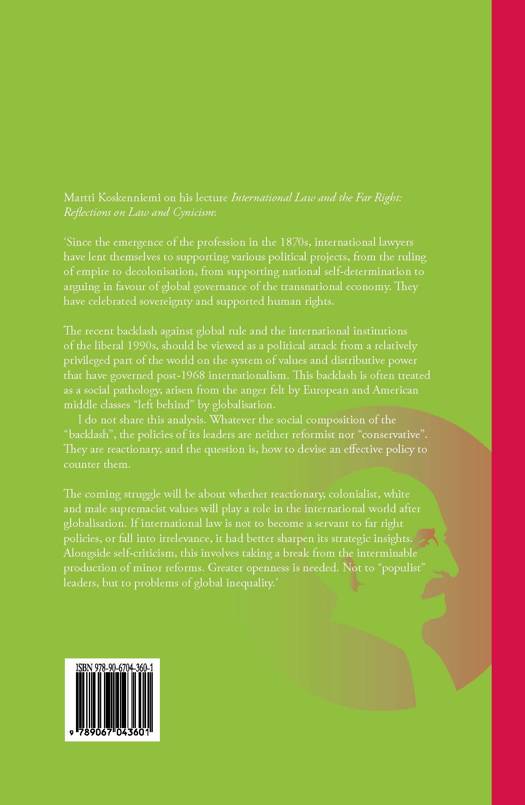
- Afhalen na 1 uur in een winkel met voorraad
- Gratis thuislevering in België vanaf € 30
- Ruim aanbod met 7 miljoen producten
- Afhalen na 1 uur in een winkel met voorraad
- Gratis thuislevering in België vanaf € 30
- Ruim aanbod met 7 miljoen producten
Zoeken


€ 10,00
+ 20 punten
Omschrijving
Martti Koskenniemi on his lecture 'International Law and the Far Right: Reflections on Law and Cynicism':
‘Since the emergence of the profession in the 1870s, international lawyers have lent themselves to supporting various political projects, from ruling of empire to decolonisation, from supporting national self-determination to arguing in favour of global governance of the transnational economy. They have celebrated sovereignty and supported human rights.
The recent backlash against global rule and the international institutions of the liberal 1990s, should be viewed as a political attack from a relatively privileged part of the world on the system of values and distributive power that have governed post-1968 internationalism.
This backlash is often treated as a social pathology, arisen from the anger felt by European and American middle classes “left behind” by globalisation. I do not share this analysis. Whatever the social composition of the “backlash”, the policies of its leaders are neither reformist nor “conservative”. They are reactionary, and the question is, how to devise an effective policy to counter them.
The coming struggle will be about whether reactionary, colonialist, white and male supremacist values will play a role in the international world after globalisation. If international law is not to become a servant to far right policies, or fall into irrelevance, it had better sharpen its strategic insights. Alongside self-criticism, this involves taking a break from the interminable production of minor reforms. Greater openness is needed. Not to “populist” leaders, but to problems of global inequality.'
‘Since the emergence of the profession in the 1870s, international lawyers have lent themselves to supporting various political projects, from ruling of empire to decolonisation, from supporting national self-determination to arguing in favour of global governance of the transnational economy. They have celebrated sovereignty and supported human rights.
The recent backlash against global rule and the international institutions of the liberal 1990s, should be viewed as a political attack from a relatively privileged part of the world on the system of values and distributive power that have governed post-1968 internationalism.
This backlash is often treated as a social pathology, arisen from the anger felt by European and American middle classes “left behind” by globalisation. I do not share this analysis. Whatever the social composition of the “backlash”, the policies of its leaders are neither reformist nor “conservative”. They are reactionary, and the question is, how to devise an effective policy to counter them.
The coming struggle will be about whether reactionary, colonialist, white and male supremacist values will play a role in the international world after globalisation. If international law is not to become a servant to far right policies, or fall into irrelevance, it had better sharpen its strategic insights. Alongside self-criticism, this involves taking a break from the interminable production of minor reforms. Greater openness is needed. Not to “populist” leaders, but to problems of global inequality.'
Specificaties
Betrokkenen
- Auteur(s):
- Uitgeverij:
Inhoud
- Aantal bladzijden:
- 42
- Taal:
- Engels
- Reeks:
- Reeksnummer:
- nr. 4
Eigenschappen
- Productcode (EAN):
- 9789067043601
- Verschijningsdatum:
- 14/10/2019
- Uitvoering:
- Paperback
- Afmetingen:
- 148 mm x 213 mm
- Gewicht:
- 153 g

Alleen bij Standaard Boekhandel
+ 20 punten op je klantenkaart van Standaard Boekhandel
Beoordelingen
We publiceren alleen reviews die voldoen aan de voorwaarden voor reviews. Bekijk onze voorwaarden voor reviews.












